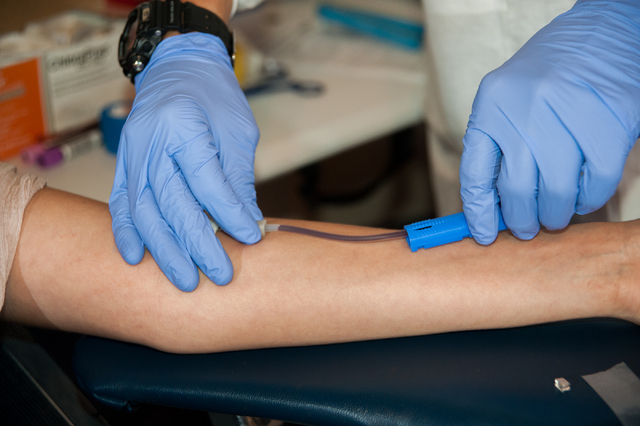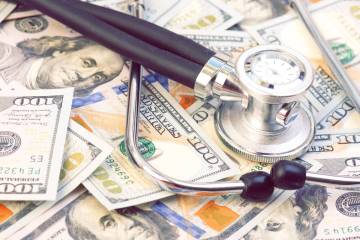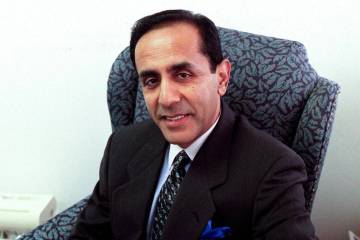Easing ban on gay blood donations should go further, Southern Nevadans say
Lifting the United States’ lifetime ban on blood donations by gay and bisexual men came as bittersweet news to some Southern Nevadans because there’s a caveat: Regulators will recommend those potential donors remain celibate for a year before they give.
Citing scientific evidence, U.S. Food and Drug Administration officials announced Tuesday that they want to replace the blanket prohibition with a new policy barring donations from men who have had same-sex relations in the previous 12 months. The ban has been in place since 1983.
Blood donations from men who have sex with men have been barred since the discovery that HIV, the virus that causes AIDS, was being transmitted through transfusions.
“That is a nonsensical rule,” state Sen. Kelvin Atkinson said. “It’s embarrassing, and it’s insulting.”
Atkinson, 45, recently wed partner Sherwood Howard, 30, in a very public display of affection among the first couples married after Nevada’s same-sex marriage prohibition was lifted. Atkinson and Sherwood have been together for 7 ½ years and are monogamous, so they are no more at risk of getting HIV than a heterosexual couple.
The senator pointed out the folly of trying to monitor whether anyone had been celibate for a year.
“How do you prove that?” he asked.
The FDA said that scientific evidence shows the move will not create risks for the nation’s blood supply. It stopped short of removing the ban altogether, which some medical groups and advocates had recommended, saying it was not supported by science.
“The FDA has carefully examined and considered the available scientific evidence relevant to its blood donor deferral policy for men who have sex with men, including the results of several recently completed scientific studies and recent epidemiologic data,” FDA Commissioner Margaret Hamburg said in a statement.
Keeping the one-year recommendation in place marks gay and bisexual men with a scarlet letter, perpetuating stereotypes and discrimination, said Ernie Yuen, executive director of Las Vegas Pride, one of Nevada’s largest gay, bisexual and transgender organizations.
“There’s the perception our blood is not good enough,” Yuen said. “HIV is not a gay disease anymore. If you look at the statistics, there are higher numbers in some demographic groups of straight people.”
Yuen knows gay men who donate blood because they lie even if they get asked about their sexual orientation. Often that happens at remote blood drives at workplaces, Yuen said, when company employees might not want to reveal personal information that a co-worker could hear.
The FDA intends to issue a draft of those proposed change in policy in 2015, which will also include an opportunity for public comment.
The FDA’s policy change is expected to boost the supply of donated blood by hundreds of thousands of pints per year. The FDA said the move aligns the policy for gay men with that for other men and women who are at increased risk for HIV infection.
“On the surface, it looks like they’re waking up to the reality of the situation,” said state Sen. David Parks, the first openly gay member of the Nevada Legislature.
“But by having that one-year ban, they’re really not changing anything. It’s a half-hearted measure.”
The possibility of any increase of donations because of the proposed change came as welcome news to Paul Milakeve, donor recruitment manager for United Blood Services in Southern Nevada.
UBS and the American Red Cross are the key organizations working to make sure the supply is available for patients needing blood in Southern Nevada.
The holidays are crunch time for blood banks because people put off giving blood because they’re too busy and the demand rises with hundreds of thousands of visitors coming to Las Vegas for New Year’s Eve. Milakeve said changes in blood donation regulations will take time to boost supply, but any growth of the donor pool will help.
“Obviously, it will increase the number of people who are eligible to donate,” he said. “The changes will take a little time to enact so we wouldn’t see that difference for a while.”
UBS is in the middle of the 13 Bloody Days of Christmas, an effort by the comedy team of Penn &Teller to increase donations at the holidays.
The comedians offer two tickets to their show for anyone who gives blood through New Year’s Day.
Even after the ban on gay blood donors is lifted, Milakeve said, UBS will need time to revamp its protocols including the health history questionnaire.
Reuters contributed to this report. Contact Steven Moore at smoore@reviewjournal.com or 702-380-4563.




























